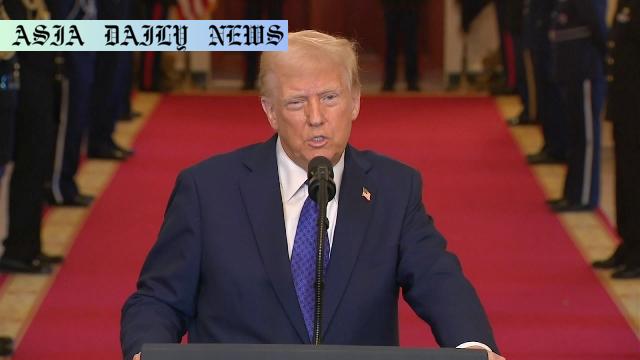Nuclear Peace Deal: Trump shows willingness to negotiate with Iran for a verified nuclear peace agreement as sanctions tighten.

Trump’s Surprising Teaser for a New Nuclear Peace Deal
US President Donald Trump has once again placed Iran in the spotlight of global geopolitics by signaling his desire for nuclear peace talks. On Wednesday, Trump took to social media to express his vision for a “Verified Nuclear Peace Agreement,” aimed at limiting Iran’s ability to develop nuclear weapons while offering a pathway for economic and societal prosperity. His remarks come against the backdrop of years of escalating tensions between Washington and Tehran, compounded by the United States’ controversial withdrawal from the 2015 nuclear agreement during Trump’s first term in office.
The Background: US Withdrawal from the 2015 Accord
The 2015 nuclear agreement, formally known as the Joint Comprehensive Plan of Action (JCPOA), was a landmark deal brokered between Iran and world powers, including the United States. It mandated Iran to curtail its nuclear activities and subject its program to international inspections in exchange for relief from stringent economic sanctions. However, in 2018, Trump pulled the US out of the agreement, citing concerns that the deal failed to address critical issues such as Iran’s ballistic missile program and its influence across the Middle East. The US subsequently reimposed tough sanctions, targeting Iran’s oil exports and other key economic sectors.
Is This a Change of Strategy or Continuation of Pressure?
Trump’s latest comments have sparked intense speculation about whether his administration is pursuing a genuine policy shift or simply leveraging negotiations to further its “maximum pressure” campaign. While Trump tweeted that he envisions Iran as a “great and successful country,” his concurrent announcement of tougher sanctions against Iranian goods paints a more nuanced picture. Some analysts interpret this as a strategic move to coerce Iran into negotiations under US terms, rather than a genuine olive branch.
Economic Consequences for Iran
Iran’s economy has been battered by US sanctions, particularly those targeting the oil industry, which serves as Tehran’s economic lifeline. The reimposed sanctions have fueled inflation, currency devaluation, and widespread discontent among Iranian citizens. Despite these challenges, Iran has resisted bowing to American pressure, instead seeking alliances with countries such as China and Russia to mitigate economic damage.
The Larger Implications for Global Security
The prospect of renewed nuclear talks between the US and Iran holds significant implications for regional and global security. A verified peace agreement could potentially de-escalate instability in the Middle East, where proxy conflicts involving Iran have exacerbated tensions. Moreover, a successful deal could serve as a diplomatic triumph for Trump’s administration, particularly as the international community increasingly prioritizes non-proliferation efforts in the face of nuclear threats emanating from other countries such as North Korea.
The Road Ahead: Challenges and Opportunities
While the idea of resuming dialogue with Iran has garnered mixed reactions, a successful outcome remains uncertain. Iran’s Supreme Leader, Ayatollah Ali Khamenei, has repeatedly rejected negotiations under duress, insisting on the removal of sanctions as a precondition. Meanwhile, the US faces domestic and international skepticism over its reliability as a negotiating partner, given its abrupt departure from the JCPOA just years earlier. Moving forward, both sides must navigate a complex web of economic, political, and ideological considerations to achieve a mutually acceptable resolution.
Conclusion: A Time for Diplomacy?
Trump’s call for negotiations reflects both a potential shift in US foreign policy and the enduring importance of the Iranian nuclear issue on the global stage. Whether these overtures will translate into substantive progress remains an open question. However, the stakes are exceptionally high, and any successful agreement could fundamentally alter the course of Middle Eastern geopolitics, fostering a new era of diplomacy and cooperation. The world will be watching closely to see if these talks bear fruit or falter under the weight of longstanding grievances and mistrust.
Commentary
The Potential Significance of Trump’s Remarks
Donald Trump’s willingness to revisit nuclear peace talks with Iran marks a fascinating, and perhaps unexpected, development in the realm of US foreign policy. While his approach still appears heavily tied to “maximum pressure” tactics, the underlying recognition of diplomacy underscores a potential evolution in strategy. It is both pragmatic and symbolic, reflecting an acknowledgment that prolonged conflict and sanctions alone may not yield desired results.
The Balance Between Pressure and Diplomacy
The coupling of a peace overture with tougher sanctions suggests a calculated mix of carrot-and-stick diplomacy. On one hand, Trump’s statements project a facade of goodwill and optimism, envisioning Iran’s prosperity under a peaceful agreement. On the other hand, the administration’s continued focus on punitive economic measures illustrates the persistent adversarial stance. This duality raises important questions about whether such methods can compel Iran to engage meaningfully or merely deepen hostility.
A Global Turning Point or a Temporary Maneuver?
For the international community, this moment represents an opportunity to reset the discourse on nuclear non-proliferation. If pursued earnestly, it could signal a return to multilateralism and sustained diplomatic engagement. However, skepticism remains about Trump’s ultimate intentions and the durability of any agreements made under his leadership. The future path depends on whether both sides can overcome years of entrenched mistrust and craft a forward-looking framework for cooperation.
In conclusion, Trump’s fresh remarks on nuclear peace negotiations reflect a complex and layered strategy that combines optimism with relentless pressure. The coming months will reveal whether these efforts lead to productive outcomes or simply perpetuate existing tensions on the global stage.


